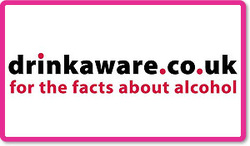
Drink Aware
The effects of Alcohol
The alcohol in your drink is absorbed into your body through the stomach and small intestine. Food slows down the rate of absorption - that's why alcohol affects you more quickly on an empty stomach.
From here, it's distributed via the bloodstream throughout the body, reaching your heart, brain, muscles and other tissues. This happens very quickly - within a few minutes. Usually, though not always, this has a pleasant effect.
Your body can't store alcohol, so it has to get rid of it - mostly via your liver. First, the liver changes alcohol into acetaldehyde - a highly toxic substance. This turns into acetate, a harmless substance, which is passed out in the urine. Some alcohol is also excreted through the breath and sweat.
Your body's ability to process alcohol depends on various things, like your age, weight and sex. Your body breaks down alcohol at a rate of about one unit per hour - and no, there's no way you can speed this up!
The downside of Alcohol
There's no getting away from it - heavy drinking, especially on a regular basis, can lead to serious health problems, including:
If you're worried about your own or someone else's drinking, you can call this free helpline, in complete confidence. They can put you in touch with your local alcohol advice centre for help and advice. Call Drinkline on 0800 917 8282 (open 24 hours)
Lots of people associate drinking with relaxation, socialising and having a good time. And if you're an adult in good health and with a good diet, drinking within the sensible drinking guidelines probably won't harm you.
The effects of Alcohol
The alcohol in your drink is absorbed into your body through the stomach and small intestine. Food slows down the rate of absorption - that's why alcohol affects you more quickly on an empty stomach.
From here, it's distributed via the bloodstream throughout the body, reaching your heart, brain, muscles and other tissues. This happens very quickly - within a few minutes. Usually, though not always, this has a pleasant effect.
Your body can't store alcohol, so it has to get rid of it - mostly via your liver. First, the liver changes alcohol into acetaldehyde - a highly toxic substance. This turns into acetate, a harmless substance, which is passed out in the urine. Some alcohol is also excreted through the breath and sweat.
Your body's ability to process alcohol depends on various things, like your age, weight and sex. Your body breaks down alcohol at a rate of about one unit per hour - and no, there's no way you can speed this up!
The downside of Alcohol
There's no getting away from it - heavy drinking, especially on a regular basis, can lead to serious health problems, including:
- Alcohol dependence or alcoholism
- Sexual difficulties, including impotence
- Cirrhosis of the liver or liver cancer
- Pancreatitis
- Stomach disorders, such as ulcers
- Mood changes
- Brain damage including memory loss or dementia
- Certain types of cancer, especially breast cancer
- Anxiety, stress, depression, poor concentration
- Increased risk of heart disease and certain types of stroke
- Potentially fatal alcohol poisoning
- Injuries and accidents
- Unsafe sex, which could result in sexually transmitted infections and unplanned pregnancies
- Fights, arguments and relationship problems
- Getting into trouble with the police
If you're worried about your own or someone else's drinking, you can call this free helpline, in complete confidence. They can put you in touch with your local alcohol advice centre for help and advice. Call Drinkline on 0800 917 8282 (open 24 hours)
Lots of people associate drinking with relaxation, socialising and having a good time. And if you're an adult in good health and with a good diet, drinking within the sensible drinking guidelines probably won't harm you.
